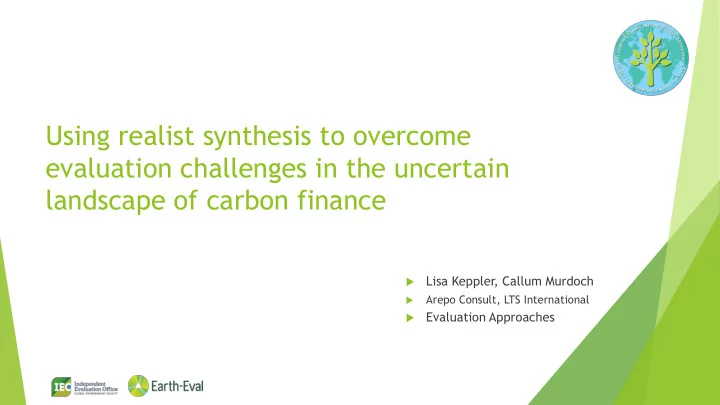

Using realist synthesis to overcome evaluation challenges in the uncertain landscape of carbon finance Lisa Keppler, Callum Murdoch Arepo Consult, LTS International Evaluation Approaches
Evaluation of the UK‘s Carbon Market Finance Programme (CMFP) implemented through the World Bank’s (WB) Carbon Initiative for Development (Ci-Dev) Carbon-funded results-based finance • Approach • Readiness grants • Support climate change mitigation and poor peoples’ access to clean Objective energy and other poverty reducing technologies (12 projects) Capacity building and carbon-related administrative support • Region Least Developed Countries (LDCs) – with a focus on Africa • Methodological Clean Development Mechanism (CDM) • Framework Inception Baseline First Mid-term Final Report Formative Evaluation Evaluation Report Evaluation 2015 2016 2017 2019 2024 Arepo Consult 2
Challenges Multi-level transformation approach Project level ➢ Local energy access markets are unpredictable ➢ Diverse project portfolio with various business models ➢ Development impact and poverty targeting Programme level Impact of CMFP/Ci-Dev on carbon financing ➢ Uncertain future of the carbon market and ongoing negotiations around Article 6 of the Paris Agreement Limited data availability and confidentiality High need for traceability in data 3 Arepo Consult
Realist Evaluation Framework Realist Evaluation: ICMO ➢ How and why does the Value for Qualitative Comparative Money (VfM) project work or not Assessment Analysis (QCA) Project Case work, for whom and in Studies: what circumstances? Theory of No Change (TONC) Benchmarking Contribution and Logframe Analysis Analysis Arepo Consult 4
How and why does the project work or not Realist Evaluation: work, for whom and in what circumstances? ICMO Intervention Context Mechanism Outcome Under the Important Response of Desired end control of influences on the result the project whether an intervention intervention target to the activates a intervention mechanism 5 Arepo Consult
ICMO Development Cycle Realist Evaluation: ICMO Refining Revising Hypothesis Hypothesis • Realist synthesis of • ICMOs developed collected primary based on TOC and • Consultations with and secondary data • Strengthening Literature review stakeholders to • Additional original ICMOs refine initial ICMOs consultations as with respect to • Additional ICMOs required testing and developed through evidence consultation (if Hypothesis Testing required) Development Hypothesis 03.10.2019 6 Arepo Consult
Development of ICMO statements to Realist Evaluation: address the different levels of ICMO transformational change targeted Direct results for the carbon market ICMO 1 Development, impact and poverty targeting ICMO 2 Barrier removal in local energy access markets ICMO 3 Market transformation and replication in carbon markets ICMO 4 Analysis of ICMO evidence with 3-stage scoring to increase robustness ➢ how strongly the evidence supports or contradicts ICMO statement ➢ how plausible or verifiable is the evidence ➢ what is the convergence of the data Arepo Consult 7
Case Market barrier analysis of case study projects based on the Studies: Theory of No Change (TONC) by Woerlen et al. (2011) Theory of No Change Lack of Lack of Policy Makers Users affordability awareness Lack of Lack of interest/ expertise motivation Legend Lack of Lack of expertise access 0 Barrier non existent Barrier non existent, but 1 Lack of Lack of cost potential for change awareness effectiveness Not a favourable situation, 2 but no significant barrier Lack of cost Lack of interest/ Not a favourable situation 3 effectiveness motivation and significant barrier Slowing down the market 4 Lack of change significantly Lack of affordability expertise 5 Impeding market change 6 Show-stopping barrier Lack of Lack of awareness awareness Lack of Financiers Lack of Supply Chain affordability expertise Lack of cost and Lack of effectiveness Infrastructure access 8 Arepo Consult
Theory-based approach to confirm that an Contribution intervention has a contributary cause to a given Analysis outcome Case study projects Did the intervention contribute to the outcome? What is the influence of external factors? Unexpected market Other programmes volatility or trends Intervention Outcome Public or social Regulatory and perception political change 9 Arepo Consult
10/3/2019 10
Challenges faced during the application of the Evaluation Framework Approach ICMOs can constrain creativity. Settling on the “wrong” ICMOs can lock teams into unproductive analysis ICMOs might appear too linear or too simplistic in very complex contexts Saturation of evidence in a limited portfolio Case studies only reflect half of the project portfolio (i.e. biased evidence for ICMO statements) Limited availability of external literature and data, i.e. for Benchmarking and QCA Limited explanatory value of VfM and benchmarking due to redefinition of programme expectations 11 Arepo Consult
Recommend
More recommend